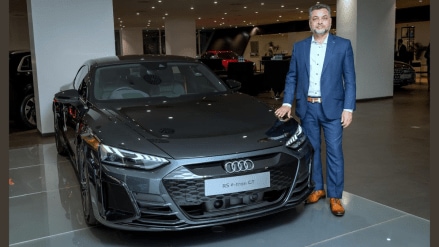Audi India had a good 2023, logging 89% sales growth, the highest since 2015. In this interview, Balbir Singh Dhillon, head, Audi India, talks to Alokananda Chakraborty about what a luxury car buyer wants from her vehicle and how the brand is gearing up to become a fully electric company in a decade. Edited excerpts:
What does Audi’s remarkable 89% growth last year say about the shifting trends in India’s automobile industry?
India’s luxury car market has rapidly evolved since the pandemic, witnessing a dynamic shift in consumer trends and buying patterns. A strong economy, a well-performing stock market, a vibrant startup ecosystem, increasing employment, and the emergence of a young and aspirational demographic have driven car sales for the luxury segment in India.
Today, it is not only about selling a car but about creating an ecosystem around it. Experiences and emotional connection with our customers is our focus. In line with this, we have pushed the boundaries within the luxury segment and we have also introduced several segment-first initiatives to enhance customer experience – the Audi Club rewards programme, experiential events in India and abroad, track drives, and weekend drives have allowed us to strengthen brand loyalty. Moreover, we have introduced digital innovations with in-app features such as ‘Charge my Audi’, to propel EV adoption among luxury customers.
Today, every fourth car we sell in India is to an existing Audi customer. It makes us very proud.
What sort of time and underprop will it take for the penetration of luxury cars to justify the potential?
Setting a definite timeline for such a shift is difficult but India’s luxury car market has an immense potential to grow. Favourable policies and a viable ecosystem will propel this growth. We are positive and expect the market to perform well in the medium to long-term.
What capabilities do you require if Audi India wants to become a fully electric company in the next 10 years?
The EV market in India is growing, however, charging infrastructure remains a point that brands and the government will continue to build. High-speed chargers on highways and busy roads will help alleviate range anxiety.
Last year, we expanded our e-tron portfolio with two new launches — the Audi Q8 e-tron and Audi Q8 Sportback e-tron. Our Charge my Audi initiative enabled e-tron customers to get exclusive access to chargers across an expansive network of 1,000-plus charging points from our partners. We also inaugurated the ultra-fast charging e-tron hub in BKC, Mumbai.
We are working towards making electric cars a more viable option in the long term. An amalgamation of OEM and government initiatives will ensure that customers feel confident about buying an EV.
If you’re in the automotive space today, you compete against Google, Apple and Microsoft. What capabilities do you need to compete with them on all fronts?
The arrival of tech giants in the automotive space is undoubtedly changing the industry. Instead of viewing them as competitors, we believe there is value in fostering partnerships and leveraging their expertise in software development, data analytics, and artificial intelligence.
Okay, so the connected car has arrived and the novelty of a new car arriving with Wi-Fi and integrated telematics has worn off. Is the connected car industry-ready for ongoing customer relationships?
The true potential for connected cars lies in building ongoing customer relationships focusing on personalisation and also by creating holistically connected ecosystems that enable comprehensive services such as remote vehicle diagnostics. As a brand, we offer these to our customers. For instance, the ‘Charge my Audi’ feature enables e-tron customers to access charging points through the myAudi Connect app, helping them efficiently plan routes, while also providing them with real-time information about their vehicle, on their mobile phones, as well as Apple Watches. We have also introduced features that allow customers to view and personalise their cars using AR and VR by sitting in the comfort of their home or office.
Does the automobile industry have the tools to truly own the contemporary automotive experience, the way Spotify owns today’s music listening experience?
With advancements in connectivity, AI, and electric vehicles, automakers are poised to create personalised, immersive driving environments. Continuous innovation and user-centric design can elevate the automotive experience, parallel to that sort of seamless and tailored engagement.
